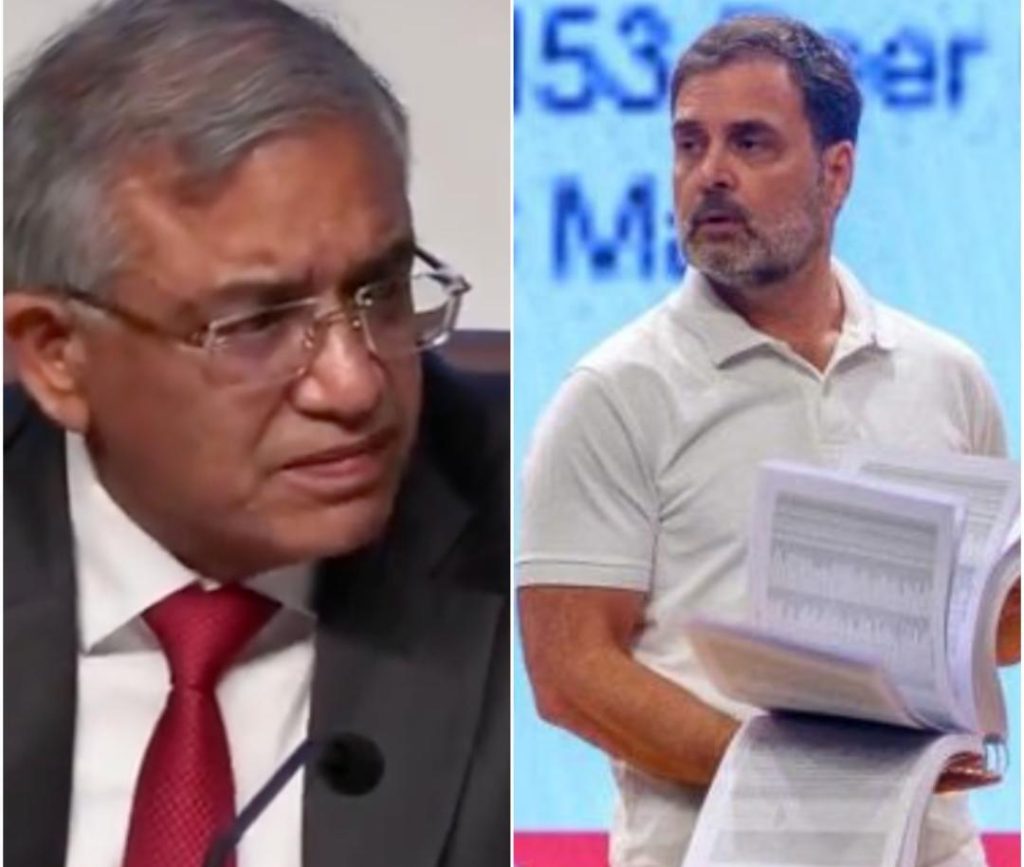
Vote Chori’ Phrase an Insult; Should We Share CCTV Footage of Mothers & Sisters Voting?: EC
The ongoing elections in India have witnessed a plethora of controversies, with political leaders making contradictory statements and allegations flying thick and fast. Amidst this cacophony, a recent statement by Congress leader Rahul Gandhi has sparked a heated debate. Gandhi has been using the phrase “vote chori” (vote theft) to claim that elections are rigged, sparking a sharp reaction from the Election Commission of India (EC).
Chief Election Commissioner (CEC) Gyanesh Kumar has termed the phrase “vote chori” as an insult to the Constitution, emphasizing that the EC will not tolerate any language that demeans the sanctity of the electoral process. In a strongly worded statement, Kumar questioned whether the EC should share CCTV footage of voters, including their mothers and sisters, to prove the allegations. This has raised important questions about voter privacy and the limits of surveillance in the name of election transparency.
The EC’s response is a fitting rebuke to those who seek to undermine the democratic process through baseless allegations and inflammatory rhetoric. The phrase “vote chori” is not only an insult to the democratic system but also an attempt to spread misinformation and create fear among voters. By using this phrase, Gandhi and his supporters are implying that the EC is complicit in electoral fraud, which is a serious accusation that can erode public trust in the institution.
The EC’s stance is also a reminder that the sanctity of the ballot is paramount. In a democratic system, the right to vote is a fundamental right, and any attempt to undermine it through malicious means is a threat to the very fabric of democracy. The EC’s role is to ensure that the electoral process is free and fair, and it is the responsibility of political leaders to respect the democratic process and refrain from making baseless allegations.
The demand for releasing CCTV footage of polling booths is another manifestation of the same problematic trend. While transparency is essential in the electoral process, the EC’s concerns about voter privacy are well-founded. Voters have the right to privacy, and their personal information should not be shared without their consent. Furthermore, releasing CCTV footage of voters, including their mothers and sisters, could be a breach of their privacy and could potentially lead to harassment or intimidation.
In a democratic system, the right to privacy is essential to protect individual freedoms and dignity. The EC’s commitment to protecting voter privacy is a reflection of its commitment to upholding democratic values. It is the responsibility of political leaders to respect this commitment and refrain from making demands that could compromise voter privacy.
The EC’s stance on the “vote chori” phrase and the demand for releasing CCTV footage is a reminder that the democratic process is not a game of conjecture and speculation. Rather, it is a serious and solemn exercise that requires respect, responsibility, and a commitment to the principles of democracy.
In conclusion, the EC’s criticism of the “vote chori” phrase and its concerns about voter privacy are well-founded. Political leaders have a responsibility to respect the democratic process and refrain from making baseless allegations. The EC’s commitment to protecting voter privacy is essential to upholding democratic values, and any attempt to compromise this commitment is a threat to the very fabric of democracy.






